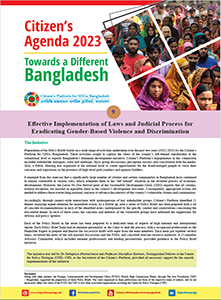 Background and Context
Background and Context
In the World Economic Forum’s 2021 Global Gender Gap Report. Bangladesh’s score was 0.719, making it one of the top countries in the region in terms of success in closing the gender gap. The country was also ranked number seven in view of the political empowerment sub-component of the index. Indeed, Bangladesh holds the distinction of being the only country where more women have held the position of head of government than men, considering the past 50 years.
However, the exercise of the rights of women has continued to remain an area of concern in Bangladesh. Civil society organisations in Bangladesh and civic movements for women’s rights and the rights of persons with disabilities have been trying to secure the interests of these disadvantaged groups in various ways. They are fighting for rights issues by raising voice in support of socially and sexually marginalised women in respective communities and by highlighting secure the interests of persons with disabilities. Of particular concern is the prevailing gender discrimination, manifested in various forms, including domestic violence, sexual harassment on the streets and workplaces, rape, marital rape, and wage discrimination in the informal sectors where women are paid less than men for the same work. When they are required to go through the judiciary process and act as witnesses, women and girls with disabilities need additional support and facilities in the form of sign language interpreters, family assistance and audio and braille support. However, these are currently not available in Bangladesh’s courts. Women are also being discriminated against through various legal loopholes. They are not able to access justice due to economic, social and cultural barriers as well as because of delayed execution of laws. Inequality and power imbalance between women and men are at the root of gender-based violence (GBV) in Bangladesh. In the absence of progressive and comprehensive laws and safeguards, discrimination and violence against women continue to persist; this is particularly so for women belonging to the vulnerable groups. Most discriminated against in this backdrop are women belonging to disadvantaged segments of the population, including low-income groups, religious minorities, indigenous people, the Dalit community, hijra and transgender people, and people with disabilities.
Published: May 2024


Leave A Comment